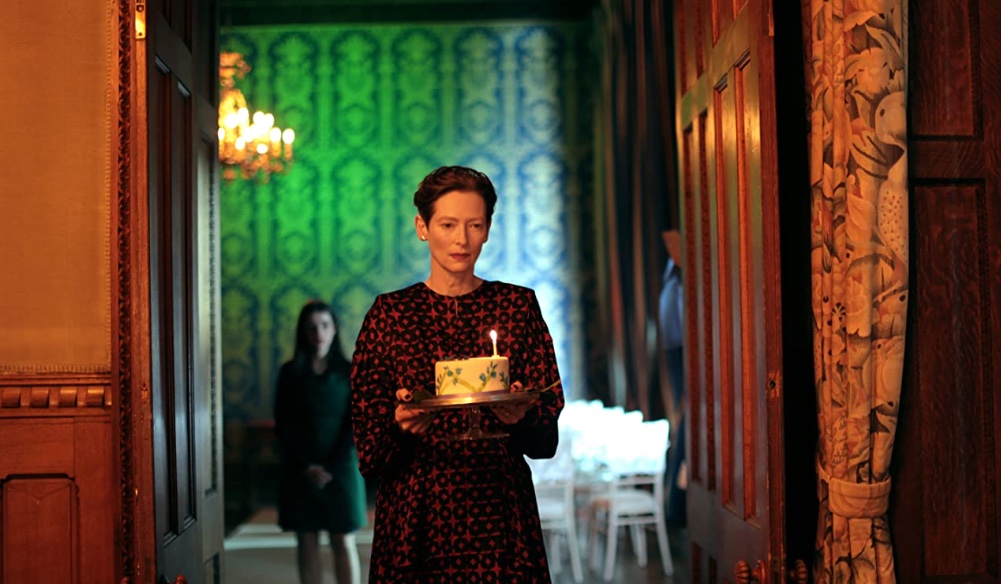
Film Review: The Eternal Daughter
Film Reviews
The Eternal Daughter
Director: Joanna Hogg
A24
In Theaters: 12.02
2022 has quietly been the Year of Tilda Swinton. She gave a grounding, humane heart to George Miller’s wonderful Three Thousand Years of Longing, she drifted leaflike on the nearly still pool of Apichatpong Weerasethakul’s nomadically screened, slow-motion dream monument Memoria, and she lent her sharp, resonant voice to Guillermo del Toro’s Pinocchio. Now, at the eleventh-and-a-half-hour, Joanna Hogg’s novella-esque drama The Eternal Daughter serves us a generous double portion of Swinton.
The film is a sort of epilogue to Hogg’s autobiographical films, The Souvenir parts I and II (2019 and 2021, respectively). After those films’ ’80s setting, The Eternal Daughter jumps forward to the present day. Swinton inherits the character Julie from her own daughter Honor Swinton Byrne while also reprising the role of Julie’s mother, Rosalind. If that genealogy reads as hard to follow, just know that Swinton plays both a middle-aged filmmaker and her elderly mother. The two accompany each other for a stay at a secluded countryside hotel, a place which was once the manor home in which Rosalind grew up. There Julie plans to write her next film using her mother’s life as inspiration, while Rosalind revisits the past she thought she had long since left behind.
The Eternal Daughter is a sequel to Hogg’s Souvenir films in the same way that some of François Truffaut’s later films were sequels to The 400 Blows: It follows the same character but at a later point in her life, with a dramatically different tone, a different genre and different thematic concerns. The Souvenir is the story of a young artist learning how to synthesize her experiences and emotions into art that can resonate with other people. The Eternal Daughter shows that same artist reflecting on her career, questioning the sources she has drawn upon and wondering how she continues from here.
The number of films in which Swinton has played more than one character is weirdly high (in fact, The Eternal Daughter is not even her first such release in 2022, as she voices two different characters in Pinocchio). This is the first time she has played the two lead characters in a film that is, essentially, a two-hander. The execution is simple and elegant: Both Swinton characters are rarely seen in the same shot. The handful of shots they do share are done with basic compositing; there’s no special effect in The Eternal Daughter that couldn’t have been done a hundred years ago. Julie and Rosalind converse through the effect of montage, through ingenuity of editing and clever distinction of Swinton’s performances. As Julie, Swinton is warm and polite, with hints of gnawing high-strung tendencies (it’s in lovely continuity with her daughter’s Souvenir performance). As Rosalind she delicately plays an aged woman who sees that her only daughter is aging as well. It’s beautiful, and it’s a magic trick that could only ever work in the medium of film.
The performances only tell part of the story, as the film is soaked in an atmosphere of gothic shadow and gloom. In the opening scene, a car’s headlights struggle to pierce the frosted darkness of a country road. Julie listens to a cab driver recall an encounter with the supernatural. Later, she reads from a collection of ghost stories, as though she expects (or perhaps wants) to be haunted in this hotel.
Hogg is speaking the visual language of cinematic ghost stories, suffusing the imagery with tense glimpses through mirrors, windows and doorways that we dare not focus on too long lest we see something from which we can’t recover. Her use of negative space is striking, with several shots of characters occupying only a small portion of the screen as though some unseen force or invisible eyes are observing what we, the audience, are also seeing. The Eternal Daughter’s location and characters are deeply haunted, whether by ghosts or not. They are haunted by the past—memories that had long since settled and secrets unintentionally kept.
All of Joanna Hogg’s work is deeply personal, and in a year of many reflective works by major filmmakers, The Eternal Daughter is one of the strangest, most tender and very best. –Daniel Kirkham
Read more reviews of movies featuring the versatile Tilda Swinton:
Film Review: Three Thousand Years of Longing
Film Review: Guillermo del Toro’s Pinocchio